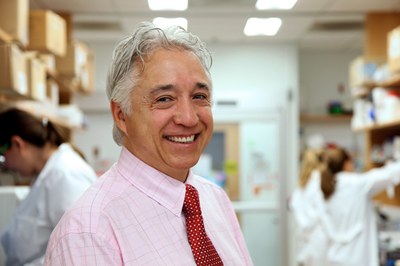
Jenna Honeycutt, PhD, lead author and postdoctoral research associate in the UNC division of infectious diseases
«These results are
Last spring, this laboratory lead by J. Victor Garcia, PhD, professor of medicine, microbiology and immunology at UNC School of Medicine, demonstrated the ability of tissue macrophages to support HIV replication in vivo in the total absence of human T cells. But how macrophages would respond to antiretroviral therapy (ART) and whether macrophages represented a reservoir for HIV after treatment were unknown.
Macrophages are myeloid lineage cells that have been implicated in HIV pathogenesis and in the trafficking of virus into the brain. Using a humanized

J. Victor Garcia, PhD, professor of medicine, microbiology and immunology at UNC School of Medicine
Now that Garcia and his team know HIV persists in macrophages, the next steps will be to determine what regulates HIV persistence in tissue macrophages, where in the body persistently infected macrophages reside during HIV treatment and how macrophages respond to possible therapeutic interventions aimed at eradicating HIV from the body.
The UNC School of Medicine team collaborated with scientists in UNC’s department of biostatistics, the theoretical division at Los Alamos National Laboratory, Veterans Affairs San Diego Healthcare System, and the departments of medicine and pathology at the University of California at San Diego. This study was funded by the National Institute of Mental Health and the National Institute of Allergy and Infectious Diseases of the
Source: http://news.unchealthcare.org/news/2017/april/unc-researchers-identify-a-new-hiv-reservoir


